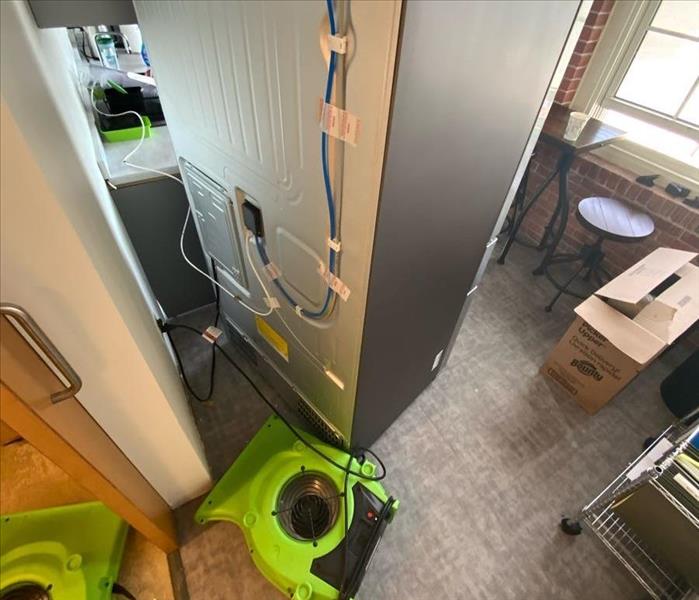Preventing Water Damage in Your Kitchen: Beware of Appliances!
5/28/2024 (Permalink)
 Your refrigerator's water dispenser and ice maker are convenient features, but they can also be potential sources of water damage.
Your refrigerator's water dispenser and ice maker are convenient features, but they can also be potential sources of water damage.
Welcome to the SERVPRO® blog! Today, we're delving into a common yet often overlooked culprit of water damage in homes: kitchen appliances. While these modern marvels make our lives easier, they can also be the source of unexpected leaks and floods if not properly maintained. Let's explore how kitchen appliances can lead to water damage and learn some essential tips to safeguard your kitchen.
1. Dishwasher Dilemmas: Your dishwasher may seem like a trusty sidekick in the kitchen, but it can turn into a troublemaker if neglected. Leaky hoses, damaged seals, or malfunctioning door latches can all result in water pooling on your kitchen floor. Additionally, overloading the dishwasher or using the wrong detergent can cause excessive sudsing, leading to leaks.
Tip: Regularly inspect the dishwasher for signs of wear and tear, such as cracked hoses or loose connections. Replace any damaged parts promptly to prevent leaks. Avoid overloading the dishwasher and use the recommended detergent to prevent suds overflow.
2. Refrigerator Woes: Your refrigerator's water dispenser and ice maker are convenient features, but they can also be potential sources of water damage. A faulty water supply line or a loose connection can lead to slow leaks behind the refrigerator, causing water to seep into the flooring and cabinets unnoticed.
Tip: Inspect the water supply line behind the refrigerator regularly for signs of leakage or wear. Consider replacing plastic water lines with braided stainless steel lines for added durability. If you notice any leaks or drips, shut off the water supply to the refrigerator and address the issue immediately.
3. Sink Struggles: The kitchen sink is a hub of activity, but it's also prone to water-related mishaps. A clogged drain or a loose pipe under the sink can result in water backing up and overflowing onto the floor. Even a small drip from the faucet can gradually cause water damage to the surrounding area.
Tip: Keep drains clear by avoiding dumping grease, food scraps, or coffee grounds down the sink. Use a drain strainer to catch debris and prevent clogs. Inspect the pipes under the sink periodically for leaks or corrosion, and tighten connections if necessary. Repair any faucet drips promptly to conserve water and prevent damage.
4. Range Risks: Your stove and oven may not seem like typical culprits for water damage, but accidents can happen. Spills and splatters from cooking can seep into the crevices around the appliances, causing water damage to cabinets and flooring over time.
Tip: Clean up spills and splatters promptly to prevent water from seeping into surrounding areas. Use silicone sealant to seal gaps between the countertop and the stove or oven to prevent water intrusion. Consider using mats or trays under pots and pans to contain spills and protect the flooring.
Conclusion: While kitchen appliances undoubtedly make life more convenient, they also pose a risk of water damage if not properly maintained. By staying vigilant and following these tips, you can safeguard your kitchen against leaks, floods, and costly repairs. Remember, a little prevention goes a long way in preserving the heart of your home!
Stay tuned to the SERVPRO blog for more expert tips on home maintenance and disaster prevention. If you ever find yourself facing water damage or any other restoration needs, don't hesitate to contact your local SERVPRO professionals for swift and reliable assistance.






 24/7 Emergency Service
24/7 Emergency Service